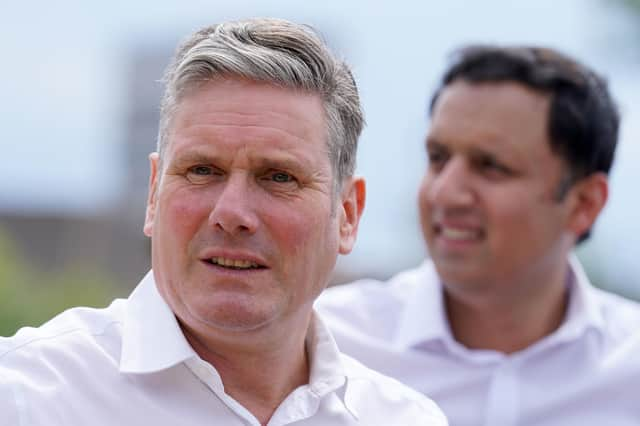Sir Keir Starmer needs to win big in Scotland to get to Downing Street - John McLellan


When Sir Keir Starmer visits Tayside on Friday with Scottish leader Anas Sarwar and Shadow Scotland Secretary Ian Murray his time will be better spent in Coldside and the East End, two of Dundee’s most deprived wards, where male life expectancy will be below the 2021 Dundee City average of just under 74, not defiantly affluent Broughty Ferry.
With 45.2 drug deaths per 100,000 people in 2021, up from 5.9 in 2004, there is nowhere quite like Independence City to illustrate SNP failure.
Advertisement
Hide AdAdvertisement
Hide AdSir Keir should get used to the schlep north, because with weekend opinion polls already showing a significant reduction in Labour’s lead only a week after Rishi Sunak took over in Downing Street ─ Labour was down six points to 44, according to Opinium for The Observer, with Conservatives up five to 28 ─ Labour needs to win big in Scotland if he is to have a realistic chance of forming a Labour government.
And the scale of the challenge was illustrated yesterday by new data from the 2021-22 Scottish Social Attitudes Survey which showed 66 per cent of people trust the Scottish Government to do the right thing for Scotland, compared to 22 per cent who trust the UK Government.
Given the fall in education standards (which 21 per cent of Scots say should be a priority), worse life expectancy in deprived communities than comparable places in England, a slower economy than the UK, as well as the host of projects on which millions have been frittered away, the job of all opposition parties is to show that while in theory the Scottish Government will always act in Scotland’s best interests, that’s not the same as the SNP’s ability to manage.
His trip is well timed, with the SNP suffering its most significant rebellion since assuming power in 2007, over First Minister Nicola Sturgeon’s Gender Recognition Reform (GRR) Bill.
With the resignation of community safety minister Ash Regan and so many SNP MSPs breaking the party whip, Ms Sturgeon’s authority is under more pressure than at any time since her appointment in 2014, including the defection of Alex Salmond supporters to form the Alba Party early last year, which if anything solved more problems for her than it created.
But her terse “good riddance” response to Ms Regan’s departure has exposed a fissure in the SNP’s approach to social reforms, and despite backing the legislation last week at Stage One, Labour is smart to position itself as a broker seeking compromises to address legitimate concerns about the bill, which Ms Sturgeon seems determined to ignore.
Gender recognition reform won’t be high on the agenda for most folk in Linlathen and Lochee, and if Labour is serious about wresting voters back from the SNP then it should be focussing on what matters most to the people it seeks to attract, showing how the First Minister’s culture war is creating needless division over an issue which will make no difference to the lives of the vast majority, even if standing up for the GRR bill might go down well in Ian Murray’s Marchmont back yard.
So too has Westminster upheaval opened an opportunity for the Scottish Conservatives unimaginable a fortnight ago as the Liz Truss administration began to crumble and the prospect of Boris Johnson’s swift return to Number 10 grew.
Advertisement
Hide AdAdvertisement
Hide AdIt doesn’t matter what individual members thought about the merits or otherwise of the past two Prime Ministers because poll after poll told the same story and only something drastic was going to make any difference.
Faster than anyone could have foreseen, that’s exactly what happened, and Scottish leader Douglas Ross now finds himself in a stronger position than at any time since he took over in August 2020. Most obviously there is a Prime Minister with whom he is far more comfortable, but just as importantly is a wider team which looks more unified than for some time.
Scotland Secretary Alister Jack has been at pains to play down rumours of rifts, and now Douglas Ross’s London flat-mate John Lamont has been appointed as a Scotland Office junior minister, talk of distance will be harder to evidence. Former Scottish party director Lord Mark McInnes, who was advising Boris Johnson on Scottish affairs and remains influential, was a school friend of Mr Lamont at Kilwinning Academy.
Recent talk of challenges for Mr Ross’s job are for the birds, and with four years to go before the next Holyrood election, he is in a stronger position than Ruth Davidson at the same stage in her leadership in 2012, when she faced passive-aggressive internal resistance, but was backed by John Lamont and Mark McInnes and with the clear patronage of Number 10.
Minds were admittedly focussed by the 2014 referendum, but in the first half of 2013, she delivered a series of policy speeches which charted a clear delivery plan in partnership with the UK Government. They led to the Strathclyde Commission, which laid the foundation for the expansion of devolution.
More devolution is not on the cards, not from this UK Government, but the Scottish party has a more stable platform to work with the UK Government to renew its Scottish strategy and to present it in the same way through bespoke events to which media attention can be attracted beyond the usual conference cycle where messages can get lost.
The social attitude survey shows why it’s important for the UK Government to be seen to be working for Scotland and it’s not just about opposing the SNP or a second independence referendum. Ruth Davidson didn’t need permission to speak and neither does Douglas Ross, but as Sir Keir Starmer tries make headway in Scotland, he does need to be heard.
Comments
Want to join the conversation? Please or to comment on this article.